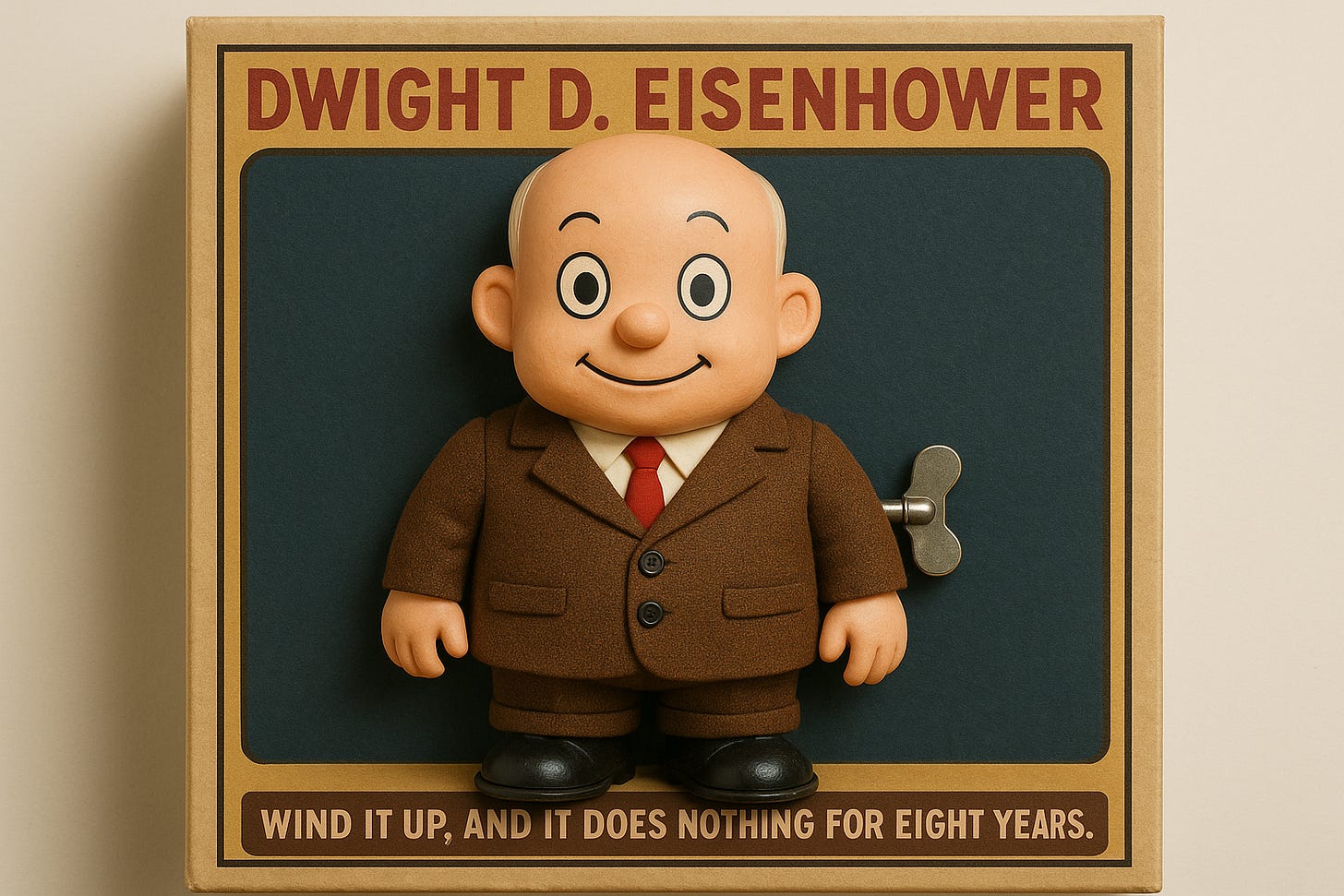“Have you heard about the Eisenhower doll? Wind it up, and it does nothing for eight years.” That was a joke that made the rounds among Democratic Party faithful in 1960 and 1961. Even then, it was not very funny. Today it is revealing.
Dwight David Eisenhower (1890–1969) was the 32nd President of the United States, serving from 1953 to 1961. During World War II, he was the Supreme Allied Commander and a five-star general. On June 6, 1944, he commanded the greatest amphibious assault in history—responsible for directing approximately 150,000 soldiers and 6,000 ships in the invasion of Normandy.1 He once said, “I hate war as only a soldier who has lived it can, only as one who has seen its brutality, its futility, its stupidity.”2
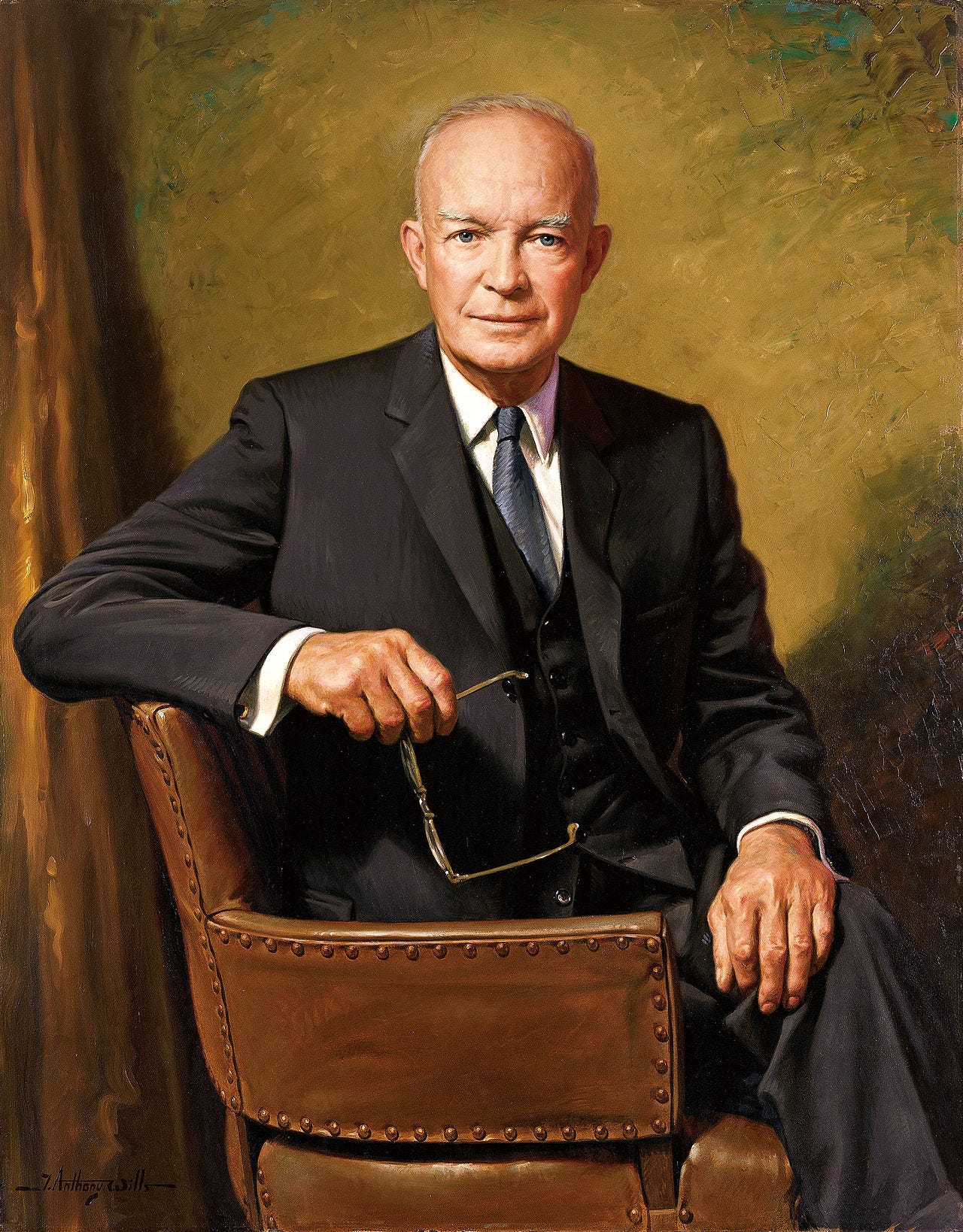
Ever since he became a public figure with America’s entry into World War II, Eisenhower was continually among the most popular and well-regarded people in the United States. Nevertheless, it was stylish among commentators in the press and in academia to denigrate him, particularly his Presidency. Condescension was common. Here is one example of many. A Princeton historian described his administrations as characterized by "drift rather than mastery."3 This historian and his colleagues never had to direct an enterprise larger than a classroom. To John F. Kennedy, who succeeded Eisenhower in the White House in 1961, “The age of Eisenhower had been bland, unimaginative, and sclerotic.”4
Kennedy described Eisenhower’s eight years as President as “the years the locusts have eaten.”5 Privately, Kennedy “jeered at Eisenhower, calling him ‘the old asshole’ to members of his entourage.” To his speech writer, historian Arthur M. Schlesinger, Jr., Kennedy described him as “a terribly cold man. In fact he is a shit.”6 It should be said that Kennedy changed his opinion, remarking later to his brother that “Eisenhower was better than I had thought."7
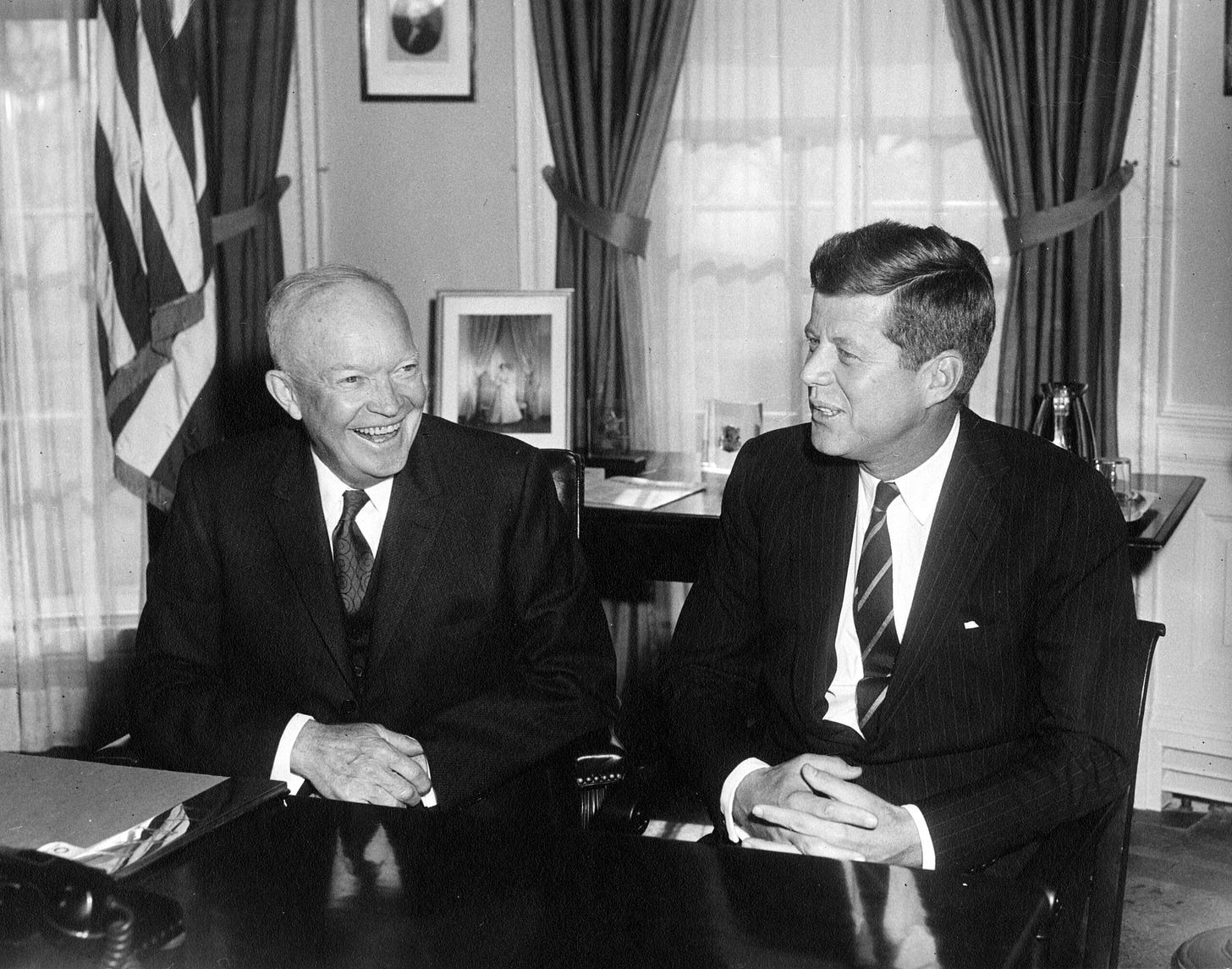
A poll of 75 historians in 1962 designed to rank the Presidents placed Eisenhower at 22 out of 31, between Chester A. Arthur and Andrew Johnson.8 Yet in 2017, a poll of more than 100 historians placed Eisenhower fifth among the nation’s 44 Presidents, behind only Washington, Lincoln, Franklin D. Roosevelt, and Theodore Roosevelt.9 This result would have astonished Schlesinger and Kennedy but it is far more accurate than the 1962 poll.
Let’s take a look at the achievements of the Eisenhower years:
The gross domestic product increased during his Presidency from $285 billion to $500 billion.10
Average family income increased 58% from the record levels of 1950.11
Ownership of homes and of automobiles increased sharply.12
Prices rose only modestly. Inflation was under control.13
Eisenhower ended the Korean War and understood that there were to be “no more Koreas.”14 He was as good as his word. He kept us out of Vietnam, the trap his successors fell into. That said, American involvement in Vietnam began on his watch, and U.S. activities there were nothing to be proud of. One historian has written that Eisenhower made “crucial decisions” which paved the way for the war.15
Eisenhower’s management of the budget was enviable. For three of his eight years in office, the budget was balanced. For the other five, he came close to that goal.16 He did not leave the Americans who came after him with anything approaching the load of debt that Trump will leave behind, if he ever actually steps down from the Presidency.
It should be emphasized that Eisenhower’s tenure in office was unique not only in American history but in world history. The United States became a nuclear nation in 1945. On August 29, 1949, the Soviet Union also became a nuclear nation, detonating its first atomic weapon four years and 20 days after the atomic bomb was dropped on Nagasaki. On November 1, 1952, the United States detonated its first hydrogen bomb, followed by the Soviet Union on August 12, 1953. During Eisenhower’s two terms in office, a war between the U.S. and the U.S.S.R. might well have meant the end of life on Earth.
There were men in both nations who did not fully appreciate what a calamity this would be. On November 18, 1956, Nikita Khrushchev (1894–1971), the dictator of the Soviet Union, unforgettably said, “Whether you like it or not, history is on our side. We will bury you.”17 How is the President of the United States supposed to respond to such a statement? Not an easily answered question. Eisenhower managed this moment and many others masterfully. War between the super powers was avoided. Indeed, no American soldier died in a pointless war during the Eisenhower years.
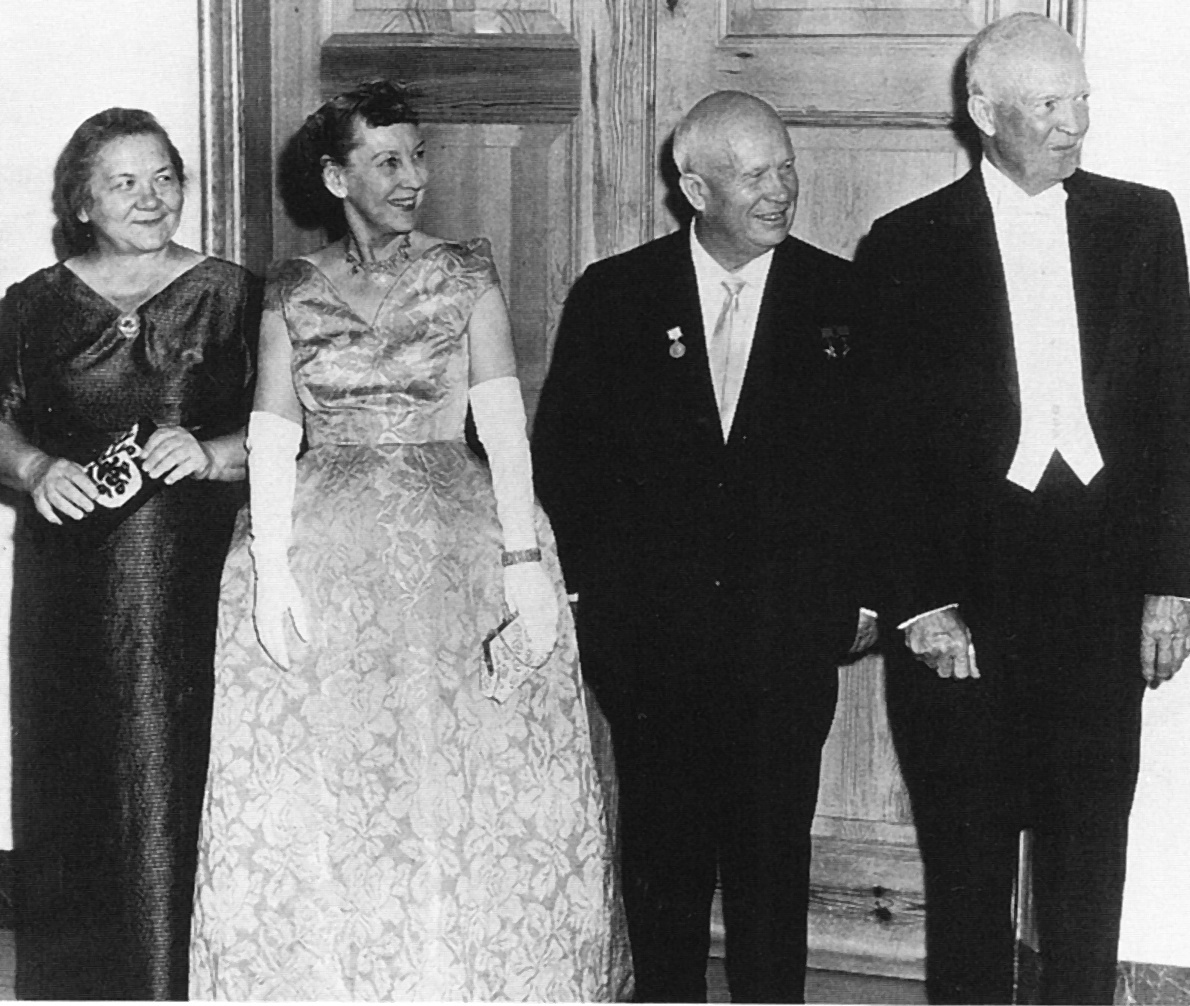
We must avoid the temptation to romanticize Eisenhower. It is important not to be naïve about him (or about any other powerful person, for that matter). He made his share of mistakes. During his administration, covert actions were undertaken from Guatemala to Iran to many other places. According to one source, the Central Intelligence Agency launched 170 major covert actions, an astonishing number, during the Eisenhower years.18 The United States today is paying the price for the ill will generated by these adventures.
Eisenhower’s record on civil rights left much to be desired. He took action to promote integration when he had no choice. However, he did not exercise the moral leadership that he was uniquely positioned to do.
The “indigenous American berserk”19 was quite active in the 1950s, especially in the person of the demagogic Senator Joseph R. McCarthy (R-WI). There was an opportunity to exercise moral leadership with regard to this reckless, destructive man. Others did, such as Senator Margaret Chase Smith (R-ME). So did the famed broadcaster Edward R. Murrow. Eisenhower adopted a hands-off approach.
Perhaps Eisenhower’s biggest mistake was allowing Richard Nixon to become a national figure on his coattails as his Vice President. It speaks well of the United States in the 1970s that Nixon was forced from the Presidency in August of 1974.
On the positive side of the ledger, Eisenhower has been described as “perhaps the least partisan president of modern times.”20 One reporter said simply, “He makes people happy.”21 A recent biographer has concluded, “he brought Americans together.”22
Eisenhower graduated from West Point in the class of 1915, known as “the class the stars fell on” because so many members became generals. The creed of West Point is: “Duty, Honor, Country.”23 Eisenhower lived by those words. His eloquent farewell address, in which he famously warned of the power of the military-industrial complex, resonates today.24
What a tragic contrast to the United States at present. Trump was born in 1946, and he was old enough to remember Eisenhower as President. As a child and then as an adolescent, Trump could see in real time what a great President could do for the country.
Trump not only fails to fight the indigenous American berserk; he bathes in it. He takes advice from Laura Loomer, a creature of the Internet who asserts that 9/11 was an “inside job,” whatever those fevered words might mean. Not all Loomer’s ideas are this crazy. She thinks Trump ought to get rid of Attorney General Pam Bondi25, which is an appealing thought.
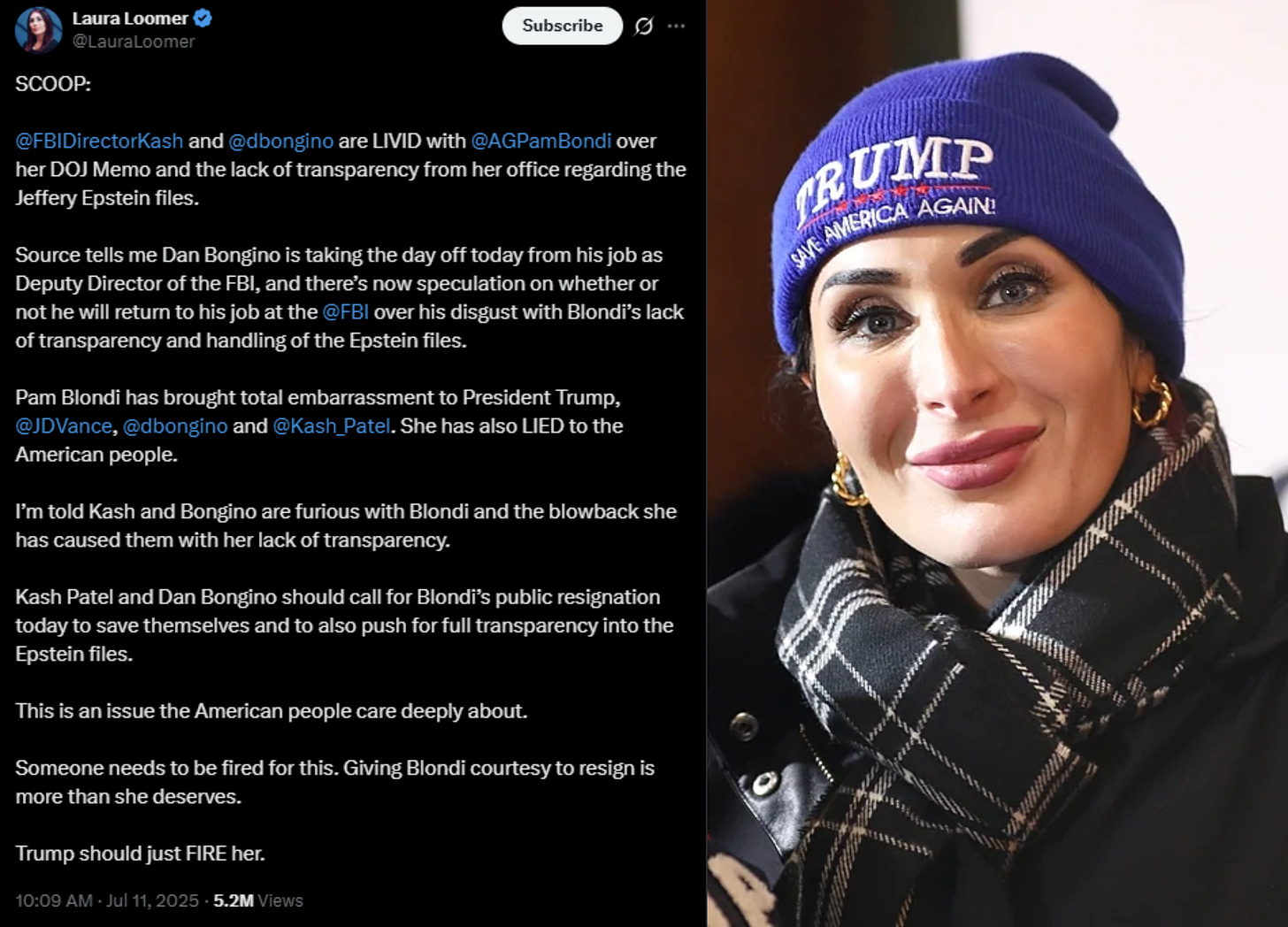
Trump is not completely unaware of Eisenhower. During a televised cabinet meeting, he looked at a painting of Eisenhower and remarked, “he was the toughest, I guess, until we came along.”26
At a typical rally on July 3, Trump said that Democrats “hate Trump – but I hate them too. You know that? I really do, I hate them, I cannot stand them because I really believe they hate our country, you want to know the truth.”27
A public statement like this from Eisenhower is inconceivable.
“First in war, first in peace, first in the hearts of his countrymen.”28
This magnificent phrase was used to describe George Washington. It would not have been inappropriate to use a similarly noble phrase to describe Dwight David Eisenhower.
How will history remember Trump?
Carlo D’Este, Eisenhower( New York: Holt, 2002) p. 7.
D’Este, Eisenhower, p. 1067.
William I. Hitchcock, The Age of Eisenhower (New York: Simon & Schuster, 2018) p. 516. Drift and Mastery is the title of a well-known book by Walter Lippmann.
Hitchcock, Age, p. 498.
Hitchcock, Age, p. 398.
Hitchcock, Age, p. 498.
Hitchcock, Age, p. 499.
Hitchcock, Age, loc. 86 – 99.
Hitchcock, Age, p. 515.
Hitchcock, Age, p. 518.
Hitchcock, Age, p. 253.
Hitchcock, Age, p. 253.
Hitchcock, Age, p. 506.
Hitchcock, Age, p. 107.
Christian G. Appy, American Reckoning (New York: Penguin, 2016) p. 90.
Hitchcock, Age, p. 518.
Hitchcock, Age, p. 451.
Appy, Reckoning, p. 39. Appy takes this number from Tim Weiner, Legacy of Ashes (New York: Vintage, 2008) p. 118. Weiner writes: “Under Eisenhower, the [Central Intelligence Agency] undertook 170 new major covert actions in 48 nations – political, psychological, and paramilitary warfare missions in countries where American spies knew little of the culture or the language or the history of the people.”
https://www.nytimes.com/2018/05/23/opinion/philip-roth-jewish-identity.html
Hitchcock, Age, p. 180.
Hitchcock, Age, p. 492.
Hitchcock, Age, p. 230.
D’Este, Eisenhower, p. 99.
https://www.archives.gov/milestone-documents/president-dwight-d-eisenhowers-farewell-address
https://x.com/LauraLoomer/status/1943673916817346656
https://www.nytimes.com/2025/07/08/us/politics/trump-cabinet-meeting-decor.html?searchResultPosition=1
https://www.desmoinesregister.com/live-story/news/politics/2025/07/03/live-updates-trump-speech-today-iowa-state-fairgrounds-america-250/84445738007/
https://www.mountvernon.org/library/digitalhistory/digital-encyclopedia/article/first-in-war-first-in-peace-and-first-in-the-hearts-of-his-countrymen





